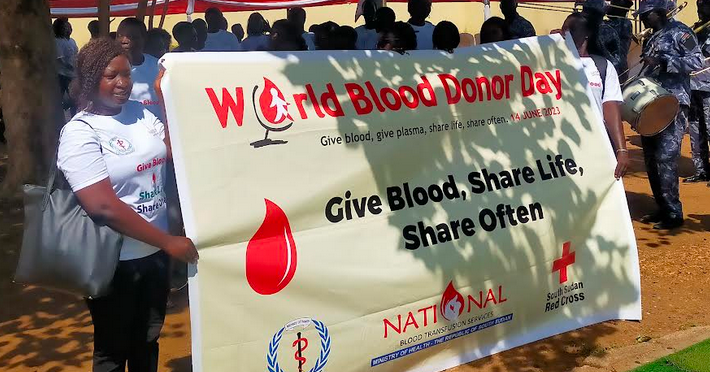South Sudan on Wednesday joined the rest of the world in celebrating World Blood Donor Day under the theme “Give blood, give plasma, share life, share often.”
World Blood Donor Day is observed on 14th June every year to raise awareness about the importance of donating blood and to thank blood donors worldwide. It aims to promote voluntary, safe, and regular blood donations to ensure a sufficient supply of blood for those in need. The day also highlights the critical role of blood donors in saving lives and encourages more people to become regular blood donors.
The event was celebrated with the donation of blood and sharing of testimonies from regular blood donors and recipients.
Speaking at the event at the Public Health Blood Bank in Juba, Health Minister Yolanda Awel Deng paid tribute to people who regularly donate blood.
“We are not doing enough awareness campaigns about donating blood. There are a lot of people in this nation who could donate blood but the word is not reaching out properly, that challenge I accept” she said. “That challenge is to all of us in the health sector, partners, donors, and everybody in the health. We accept the challenge to make sure that we reach more audiences.”
The minister also appealed to musicians to compose songs that encourage people to donate blood.
She decried the appalling working conditions of the staff of the blood bank who work long hours with little pay.
“Empowering the blood transfusion facilities across South Sudan is very crucial and empowering the staff who works in these facilities is important. Sometimes they work for long hours, sometimes they are called beyond their working time because of emergencies and they turn to be beggars for people to donate blood” Awel said. “I am calling upon South Sudan to take the ownership of blood donation in our country because it has to come from a personal space, nobody has to force you but it is an act of patriotism.”
For her part, Dr. Mutale Senkwe, the World Health Organization’s (WHO) representative, said the demand for blood and blood products continues to grow due to several factors including increased maternal complications, child malnutrition, trauma due to violence, and medical procedures.
She recognized the critical contribution of voluntary unpaid blood donors who save many lives and said donating blood is an act of solidarity that can ease the pressure on the health system.
“According to the WHO, 1 percent of the population needs to donate blood to meet the annual requirement. Under this principle, in South Sudan we should be collecting an estimated 120,000 units for the population that we are saving,” she said. “What we are currently seeing is a donation of 15 units per day which translate to 5,475 and this is a very small amount compared to the 120,000 units required.”




